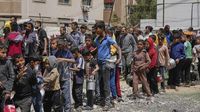In a stark reflection of the ongoing humanitarian crisis in Gaza, long lines of Palestinians are waiting for food aid at the Nousseirat refugee camp. This dire situation has been exacerbated by a total blockade imposed by Israel, which has halted all humanitarian aid deliveries, including food supplies and medicines, for over six weeks. This blockade followed the collapse of a ceasefire agreement with Hamas in January 2025.
The United Nations Relief and Works Agency for Palestine Refugees in the Near East (UNRWA) has reported that the supplies that managed to enter Gaza during the brief ceasefire are now nearly exhausted. As hunger spreads throughout the enclave, the urgency for international assistance has never been more critical.
On April 14, 2025, the European Commission responded to the escalating crisis by announcing a substantial aid package of 1.6 billion euros aimed at supporting the Palestinian Authority. This announcement came during the first high-level political dialogue between the European Union and the Palestinian Authority, held in Luxembourg.
This new aid program is set to be deployed over two years, from 2025 to 2027, and includes approximately 620 million euros in direct budgetary assistance to the Palestinian Authority, alongside around 576 million euros in grants to support concrete projects on the ground. Furthermore, the program allocates up to 400 million euros in loans to bolster the private sector.
During the meeting, which included key figures such as Palestinian Prime Minister Mohammad Mustafa and EU foreign policy chief Kaja Kallas, the discussions emphasized the need for sustaining the Palestinian Authority as a credible partner. Kallas stated, "We want them to reform, because without reform, they won't be strong enough to be a partner, not only for us but also for Israel," highlighting the EU's focus on governance and stability in the region.
Despite the promising financial support, the European Union's efforts to mediate a political solution remain fraught with challenges. The backdrop of the meeting included an intensification of Israeli military operations in Gaza and ongoing tensions in the West Bank. Reports indicate that human rights violations are rampant, with the Israeli military's occupation and settlement expansions further complicating the situation for Palestinians.
As the EU seeks to maintain dialogue with both Israel and the Palestinian Authority, the complexity of international relations in the region is evident. The meeting in Luxembourg occurred nearly two months after the Association Council meeting with Israel, underscoring the delicate balance the EU attempts to strike in its foreign policy.
In a related development, French President Emmanuel Macron and Palestinian President Mahmoud Abbas have reiterated the urgent need for a ceasefire and a political solution based on a two-state framework. Their conversation emphasized the importance of immediate action to alleviate the suffering of the Palestinian people.
While the EU's financial package is a significant step towards providing relief, skepticism remains regarding its effectiveness amidst the ongoing violence and political stalemate. The lack of consensus among EU member states on how to address the situation—particularly regarding potential sanctions against extremist Israeli settlers—further complicates the EU's position.
As humanitarian conditions worsen in Gaza, the international community is watching closely to see how these developments will unfold. The EU's commitment to financial assistance is crucial, but it must be accompanied by a concerted effort to address the underlying political issues that perpetuate the cycle of violence.
The situation in Gaza and the West Bank remains precarious, with the potential for further escalation looming. The humanitarian crisis, marked by widespread hunger and lack of basic necessities, calls for urgent international attention and action.
In conclusion, as Palestinians continue to face severe challenges, the need for a comprehensive and sustainable solution becomes increasingly urgent. The EU's financial aid represents a vital lifeline, but without accompanying political progress, the path to peace remains uncertain.





